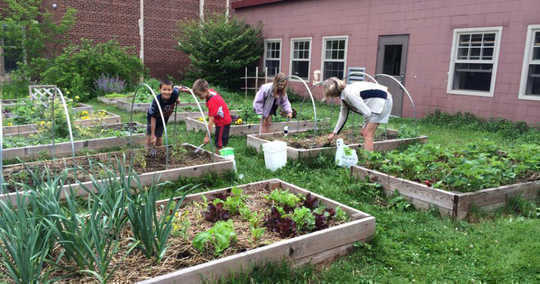
Rural school gardens get students back in touch with their food, a new study finds.
As technology and supermarkets have made buying food easier and more convenient than ever, researchers believe people are growing more distant from the food they consume.
As knowledge about crops, food production, and healthy eating is lost over generations—a process sociologists call “de-skilling”—some school districts are looking to reconnect children with their food by educating them in a garden setting.
For their new study in Agriculture and Human Values, researchers observed one such “school garden” in a rural Midwestern school district, in which teachers held classes outside in a garden one or two times per month.
Get The Latest By Email
Not only was the concept successfully integrated into an otherwise normal public school district, but it also fostered an appreciation for fresh, healthy foods.
“We have lost touch with a lot of basic skills related to food, which raises concerns for the future of food production and the eating habits of our children,” says Mary Hendrickson, an associate professor of rural sociology at the University of Missouri’s College of Agriculture, Food and Natural Resources.
“We wanted to see if allowing children to ‘taste’ their education in a garden setting could have the potential to reorient them toward environmental and health issues that will only become more important as they grow. This case study showed that the answer is ‘yes.’ The potential is there.”
The idea of school gardens is not new, but the vast majority of these programs have occurred in wealthy urban settings. In this case, however, the school garden was in a school district not particularly wealthy, allowing researchers to study the program’s impact on a broader socioeconomic range.
Beginning as an after-school club led by volunteers, the program eventually transitioned to the control of the school district. The district incorporated it into the school day an average of one or two times per month, when students would attend classes outside surrounded by fruits and vegetables. Each grade level received their own dedicated garden.
Through on-site observations and interviews with participating educators and staff, researchers found that school garden education affected the children beyond the classroom, with students expecting healthier options on the school’s salad bar and starting their own gardens at home, as well as generally expressing more interest in food production and preparation.
In addition, researchers say the school district’s smooth acquisition of the program offers an unusual and encouraging example of its potential for more widespread adoption.
“Re-skilling our children isn’t just about creating economic opportunities, though as the average age of farmers continues to rise, we do need more young people who are interested in agriculture,'” says Sarah Cramer, who worked on the study while earning a doctorate.
“What we heard from the people involved in this program is that their children are more interested in eating healthier and embracing alternative food systems like organics and farmer’s markets. Ultimately, this is about giving children more control over their lives by showing them that they have choices.”
While rural America plays a pivotal role in the nation’s food production, many participants interviewed for the study noted that a disconnect between producer and consumer remains. Putting children in closer touch with agriculture at a young age could close that gap, Cramer says.
“I think that people recognize that we are a rural community, but we are not healthy eaters,” one participant said. “We do cattle and chickens, but we don’t have gardens because when I was growing up…we didn’t talk about healthy food. Nobody really grew food.”
In allowing children to see, taste, and learn about food, school gardens offer them the chance to change the food culture for themselves and their communities, Cramer says.
About the Author
Anna Ball, formerly at the University of Missouri and now at the University of Illinois, contributed to the research.
books_garden







